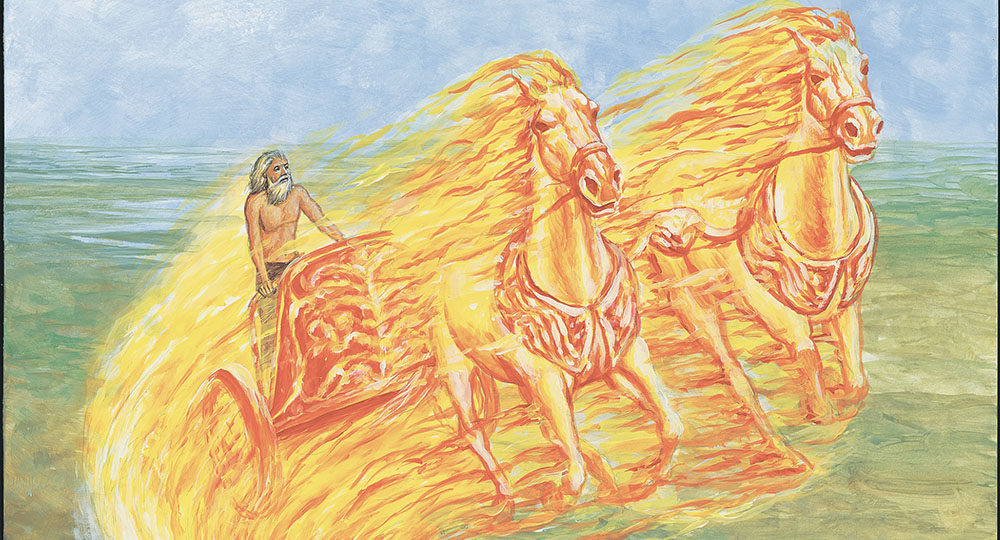Caught Up With Christ
“And he died.” This terse statement echoes eight times throughout the fifth chapter of Genesis as a reminder of sin’s deadly price. Yet in contrast with this chorus of death is a solo voice of hope. In the seventh generation from Adam, the words change. Enoch did not die “for God took him” (Gen. 5:24).
Early in God’s dealings with mankind, the Scriptures teach of a way to escape the curse of death and dust (Gen. 2:17; 3:19). Enoch “walked with God” (Gen. 5:22) and eluded the curse of physical death.
This small hint of hope reappears once more in the Old Testament. The prophet Elijah “went up by a whirlwind into heaven” (2 Ki. 2:11). These two men foreshadow an entire generation of believers who will enjoy the unique blessing of instant transferal into God’s presence.
To be removed bodily from the earth to meet the Lord Jesus Christ— is that a strange notion? For many in this technological age, it sounds like science fiction. To skip the normal process of dying and death seems quite farfetched. Yet this phenomenon is exactly what the Scriptures clearly present. God’s people have always believed in the ultimate hope beyond the grave. New Testament Christians have clung to a further promise held out to every generation of believers in Messiah Jesus—He may come today and take you to heaven in an instant! When we understand what the next three portions of Scripture teach about this exciting subject, the truth will flood our hearts with hope.
We Will be Received by Jesus (Jn. 14:1-3)
The scene was grim. Jesus had told His disciples that He would soon die and leave them, that one of them would betray Him, and that Peter would deny Him. Those men had just witnessed Judas’ departure from the Upper Room. Things were about to unravel in ways unforeseen by these loyal men. Jesus provided words of comfort and hope that look far beyond their own day: “Let not your heart be troubled” (v. 1).
Jesus reassured His followers that His own departure from this life involved the preparation of a place for them: “In my Father’s house are many mansions [dwelling places]; . . . I go to prepare a place for you” (v. 2). These dwelling places would become their new homes someday. After He finished His task, He promised to return for them. In memorable words, Jesus described this loving regathering: “I will come again, and receive you unto myself, that where I am, there ye may be also” (v. 3). Those early believers kept that promise alive. They looked for that day with longing and excitement.
It is crucial to note the impact of this simple promise, which points heavenward. Jesus will take believers to heaven. Nothing is said of their death, of His return to the earth, or of any events that need to occur before He takes believers home with Him. The promise is simple and clear—Jesus will return to take His people to heaven.
We Will Be Changed by God (1 Cor. 15:51-54)
“Behold, I show you a mystery: We shall not all sleep, but we shall all be changed” (v. 51). The apostle Paul added further details to Jesus’ teaching about His Second Coming and His removal of believers from the earth. The term mystery describes something formerly hidden but later revealed. Some truths about Jesus’ return were not revealed in the Old Testament but were made known only through Jesus and His apostles in the New Testament.
One of these truths is that, at our Lord’s return, believers’ bodies will not “sleep” (experience physical death) but be instantly transformed. This spectacular event will happen in “a moment, in the twinkling of an eye” (v. 52). Imagine what it will be like for someone who is looking at another person when, in a split second, as fast as a blink of the eye, the person vanishes!
After Messiah Jesus returns to receive His bride (all born-again believers), only those who have not trusted in His gift of salvation will be left on earth. Other Scriptures indicate that these unbelievers will enter a seven-year period of tribulation that will be the time of God’s wrath.
The second truth Paul revealed was that deceased believers in Christ will be raised at Jesus’ coming. This transformation will occur “at the last trump; for the trumpet shall sound, and the dead shall be raised incorruptible” (v. 52a). The curse of death will be permanently reversed for them, and believers living at that time “shall be changed” as well (v. 52b). All these people will receive new bodies that will not be subject to sickness, pain, or death. Paul quoted the prophet Isaiah (25:8) at the end of verse 54:
So, when this corruptible shall have put on incorruption, and this mortal shall have put on immortality, then shall be brought to pass the saying that is written, Death is swallowed up in victory.
What God desired in the Garden of Eden and what He graciously gave to Enoch and Elijah is what an entire generation of believers will one day experience—instant transfer to heaven. At the same time, those believers who have died will experience complete victory over death.
We Will Be Caught Up With Jesus (1 Th. 4:13-18)
In this passage, Paul presented many details about Jesus’ return and our participation in that great event. The reason for Paul’s lengthy explanation lies in the Thessalonians’ concern for their departed loved ones. They were grieving because they thought that their deceased friends would not share in the blessings of the Second Coming of their Lord and Savior. While believers do indeed sorrow over death, it is not an empty grief. Paul wrote so “that ye sorrow not, even as others who have no hope” (v. 13). Hope transforms sorrow.
The anticipation that Paul presented to the Thessalonians and, indeed, presents to us as well is that, when Jesus returns, all who have received Christ as personal Savior throughout the ages will be together. Those who have departed this life will not be forgotten, for God promises to unite with Jesus all those who have died in faith and to give them future blessing (v. 14). In fact, deceased believers will be the first to meet the coming Christ: “we who are alive and remain unto the coming of the Lord shall not precede them who are asleep” (v. 15).
It is important to remember that Paul thought Christ might indeed return within his own lifetime. Jesus Himself taught that the time of His return is unknown to all but the Father. Thus believers must constantly be ready (Mt. 24:36, 44; 25:13). The hope of the imminent appearing of our Lord Jesus is found throughout the New Testament (Rom. 13:11; 1 Cor. 16:22; Phil. 4:5; Jas. 5:7–9; 1 Pet. 4:7; Rev. 22:20). Notice the details Paul described. First, Jesus will come down from His present home.
For the Lord himself shall descend from heaven with a shout, with the voice of the archangel, and with the trump of God; and the dead in Christ shall rise first (v. 16).
The dead will be roused by the archangel’s command and trumpet blast. This authoritative call to resurrection is what Paul called “the last trump” in 1 Corinthians 15:52.
Next, “we who are alive and remain shall be caught up together with them in the clouds, to meet the Lord in the air; and so shall we ever be with the Lord” (v. 17). All Christians who are alive at this time will be “caught up” into the clouds with Jesus and the resurrected believers. The term rapture (from the Latin verb rapto meaning “to pluck up, to snatch away”) is used to describe this momentous event. Just as Enoch and Elijah were raptured by God, so, too, will a future generation of Christians avoid the walk through the valley of the shadow of death. They (or, perhaps, we) will thereafter experience the unbroken presence of our Lord.
In an obvious application, Paul concluded by commanding Christians to “comfort one another with these words” (v. 18). This passage holds immediate hope for all God’s people. Since Paul’s day, all believers in Jesus the Messiah have looked forward with expectancy to the next event on God’s prophetic calendar—Jesus’ return at any moment.
We Are the Bride of Christ
This Rapture promise finds a fascinating parallel in ancient Jewish marriage customs. In his book Maranatha Our Lord, Come! (The Friends of Israel) Dr. Renald Showers describes these customs in detail. The betrothal of a bride and her bridegroom first required the young man to pay a negotiated price for his fiancée. The paid dowry formalized the marriage covenant, and the couple became husband and wife. Then the bridegroom returned alone to his father’s house and spent about one year preparing a dwelling place for his bride. When the abode was ready, he secretly returned at night to take his bride home with him.
This joyous reunion involved many attendants and festivities to celebrate the consummation of the marriage. The couple remained secluded from the guests for seven days, after which both the bridegroom and the unveiled bride came out to greet the public.
The wedding analogy is clear. Jesus left heaven to seek His bride and pay for her with the price of His sinless life, death, and resurrection. The church is presently separated from her betrothed, ever guarding her purity, while He prepares to return. Some day Jesus Christ will snatch His bride from the earth. That event will hasten the world’s plummet into outright rebellion, headed by the Antichrist. Only after seven years of tribulation will our Lord Jesus return “with power and great glory” (Mt. 24:30; cf. Rev. 19:7–16). That coming with His bride will be unlike the Rapture when He comes for His bride. At His Second Coming, Jesus will return to the earth with His bride to judge the world and establish His Kingdom on earth. The love of the Bridegroom for His bride will someday be seen visibly in the Marriage Supper of the Lamb.
May believers in Messiah Jesus continue to be faithful, loving, and devoted to the One who died, rose, and is soon coming for His bride.








Paul didn’t actually introduce the concept of the rapture, he expounded on it. Paul begins 1 Thessalonians 4:15 with “according to the Lord’s own word”; there is no place in the New Testament where Jesus speaks of some being resurrected and some others being transformed to meet the Lord in the air. He never said anything like that, nor does he even imply such a thing. So to which of the “Lord’s own words” was Paul referring to? The answer can be found in Isaiah 26:19-21 and 57:1, 2. Isaiah introduced the concept but being non-understood it was a mystery. Paul revealed the explanation of that mystery. Paul and the other apostles obviously thought they would see the Lord return while they were still living. All this makes perfect sense since God says, “Indeed, the Sovereign LORD never does anything until he reveals his plans to his servants the prophets.” Amos 3:7